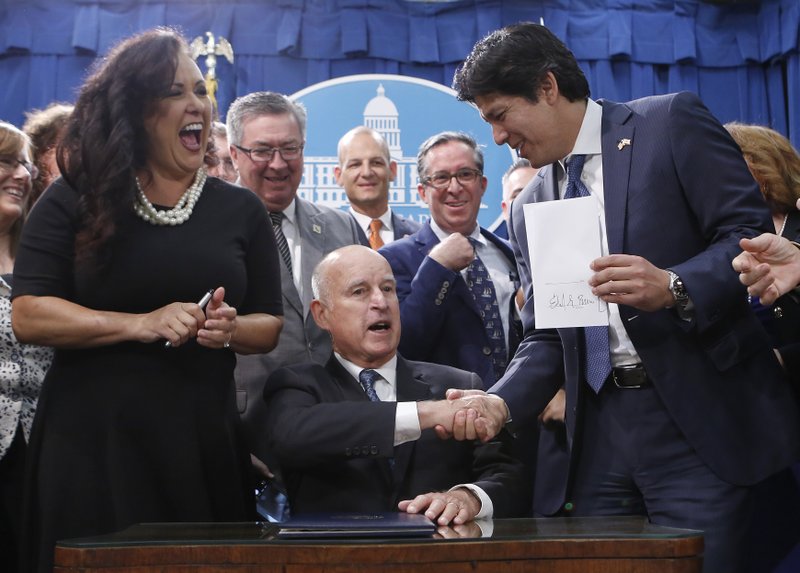SACRAMENTO, Calif. -- California has set a goal of phasing out electricity produced by fossil fuels by 2045 under legislation signed Monday by Gov. Jerry Brown.
Brown, who has positioned California as a global leader in the effort to reduce greenhouse gas emissions, approved the measure as he prepares to host a summit in San Francisco of climate change leaders from around the world starting Wednesday.
The renewable energy measure would require California's utilities to generate 60 percent of their energy from wind, solar and other specific renewable sources by 2030. That's 10 percent higher than the current mandate.
The goal would then be to use only carbon-free sources to generate electricity by 2045. It's merely a goal, with no mandate or penalty for falling short.
The measure, passed last month by the Legislature, will eliminate the reliance on fossil fuels to power homes, businesses and factories in the world's fifth-largest economy, accelerating a shift already under way. The state currently gets about 44 percent of its power from renewables and hydropower.
"It's not going to be easy and will not be immediate, but it must be done," Brown said. "California is committed to doing whatever is necessary to meet the existential threat of climate change."
Earlier this year, California became the first U.S. state to mandate solar rooftop panels on almost all new homes. It would be the second state to require 100 percent carbon-free power after Hawaii.
The move would accelerate a shift to wind and solar but hinges on a big bet that battery costs will plunge, allowing for a transition away from the natural gas plants that provide about a third of California's electricity.
Proponents of the bill say solar and wind energy already compete in price with fossil fuels and that costs are expected to decline further. But they also note that the measure allows for a mix of clean-energy resources, including large hydroelectric dams.
Phasing out fossil fuels would be a big change in the energy grid. Utilities rely on natural gas plants to meet demand when renewables fall short, particularly in the early evening when the sun sets and people turn on their air conditioners as they get home from work.
Utilities are already dealing with an abundance of solar energy during peak times, which must be offloaded to other states when there's not enough demand locally for the power.
Renewable energy experts have looked to batteries that can store solar energy generated in the afternoon as one solution, but the technology is not ready for wide-scale deployment. Another potential solution is pumped storage, in which water is pumped uphill in the afternoon using solar energy and then released through hydroelectric generators after the sun sets.
Brown's announcement comes ahead of a climate summit he is hosting this week in San Francisco that will draw local governments, businesses and investors from around the world. He has taken on the mantle of leading the U.S. effort to combat climate change as President Donald Trump has sought to roll back environmental regulations and support coal-fired power plants. Brown is also fighting the Trump administration's effort to deny California's authority to set its own, more stringent auto-pollution standards.
Brown has often faced criticism that he's too cozy with the oil industry, including from environmental groups that plan to protest at the San Francisco summit. They're pushing him to create a moratorium on new oil wells in the state.
California ranked sixth among states in crude oil production in May, the latest data available from the U.S. Energy Information Administration. The state ranks 15th in natural gas production. California's production of crude oil has fallen steadily since the mid-1980s.
Opponents -- including the state's investor-owned utilities run by PG&E Corp., Edison International and Sempra Energy -- said the renewable energy goal is not realistic and raised concerns that the requirement would increase electricity costs. California would need to install more than 200 times as much energy-storage capacity than it has now to make up for the loss of gas plants, according to the Clean Air Task Force, a Boston-based energy-policy nonprofit.
The measure was written by state Sen. Kevin de Leon, a Los Angeles Democrat who is running for U.S. Senate against fellow Democratic U.S. Sen. Dianne Feinstein.
"Today we're setting a marker that will be remembered by future generations," de Leon said.
California has met its goal to reduce total greenhouse gas emissions to 1990 levels, an accomplishment that relied heavily on building cleaner power plans.
But electricity accounts for only 16 percent of California's emissions. Further reducing carbon discharges will require a significant reduction in vehicle emissions, which have inched up recently.
After signing the bill Monday, Brown also signed an executive order directing the state to achieve "carbon neutrality" by no later than 2045. After that, he says the state should emit net negative greenhouse gas emissions.
The order directs several state agencies to set targets for artificially removing carbon dioxide from the air through a process known as "sequestration."
Information for this article was contributed by Jonathan J. Cooper of The Associated Press and by Mark Chediak and Romy Varghese of Bloomberg News.
Business on 09/11/2018

